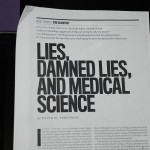Remember when phlogiston was the answer? Well maybe not; that was a long time ago, but ideas in science and medicine come and go.
Two things reminded me of that in the last few days. I usually try to keep up with developments in those areas of medicine that I have a direct or even peripheral interest in. I read the abstracts in the Annals of Internal Medicine and decide which articles make sense to read in full. I look through the bi-monthly Journal Club appended to Annals and do the same.
Then I find suggestions in the two papers and several magazines I read and hunt down the original articles on which they are based.
Some of that is personal; we each take several prescription meds plus a senior vitamin, a large-dose B12 pill, vitamin C, fish oil capsules and vitamin D each day and our supplements have varied over the years as new articles come out.
But even as a medically-trained (now retired for 12+ years) individual, there are times when I find a sudden switch in the conventional thinking to be jarring.
Two of those happened in the past week.
I was about to write a blog post on Omega-6 to Omega-3 ratios in our diet and give my take on what our optimum ratio should be. American diets have had a ratio well over that in many countries; some advise altering that from the current/recent 15:1 or even 40+:1 to 2:1 or 1:1.
Then my wife, aware of my interest in the area, showed me an article that led me to contacting a senior Harvard professor. Dr. Frank Sacks works in the Department of Nutrition in the Harvard School of Public Health and has chaired, co-chaired or been the principal investigator on a number of well-known, multi-center studies.
He was kind enough to respond to me email and sent me two of his publications, one from the journal "Circulation 2009; 119; 902-907 and the other from The Journal of Clinical Endocrinology and Metabolism 91(2): 309-400. Bottom line: he feels both Omega-6s and Omega-3s are good polyunsaturated fatty acids (PUFAs) and that ratios make no sense. I'm still digesting his articles and may comment on them later.
Then a friend gave me an article from The Atlantic. It had the intriguing title I pasted in above. I read the lay publication and then Googled the man written about.
Dr. John Ioannidis is a Professor of Medicine at a Greek university, Adjunct Professor at Tufts (where he did his fellowship after graduating from Harvard) and Director of the Preventive Medicine Research Center at Stanford.
Nearly ten years ago he began a project in Greek hospitals that eventually led him to state as much as 90% of the research articles published in medical journals have one or more critical flaws. This isn't limited to medicine, of course. Similar work, termed meat-resaerch, has been done in a variety of scientific fields, with the same conclusions.
Yet a late 2007 blog post by a surgeon/scientist comments 1). to paraphrase Churchill's famous bon mote on democracy, medicine's use of randomized clinical trials and peer-review is the worst way to find the best new treatments, except for all other ways. Whether "evidence-based" reviews have improved the system remains to be seen.
Statistical analysis, as done in a commentary on Ioannnidis's work, can explain why even a quarter of the very best studies can yield incorrect results.
Yet medicine moves on, discarding treatments found to be ineffective or harmful.
In the meantime, I'll not try the latest and "best"..at least not most of the time.

